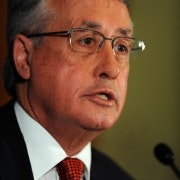Slash and burn won't save Australia's budget
So the drop was delivered to the dailies, ahead of a Prime Ministerial speech that, in effect, is now redundant: tax revenue has been written down by a further $12 billion.
Labor's surplus will now most likely only be found at the end of the 'forward estimates' on budget night, and possibly not even then.
Shadow treasurer Joe Hockey continues to blame the government’s profligate spending. According to the mid-year economic and fiscal outlook, spending this year will be 23.8 per cent of GDP; it is said to be tracking a little below that. In the last Howard budget, it was 23.1 per cent of GDP, the lowest that government ever managed, having hit 25 per cent in the early part of last decade. More to the point, that 23.8 per cent compares with 25.3 per cent the previous year. That 25.3 per cent is padded with extra spending brought forward from 2012-13, but Labor is still engaged in a significant fiscal contraction, worth 1.5 per cent of GDP.
With both sides having reduced the economic debate to an argument over the size of their respective surpluses in recent years, our politicians are now stuck with having to discuss fiscal policy like vaguely intelligent people rather than two yobbos down the pub. Nuanced, hard-to-explain concepts like nominal GDP have been spotted in the wild for the first time. But try explaining to punters why persistently low inflation can actually be a problem, especially when you’re still telling them that in fact they’re doing it tough because of the “cost of living pressures”. And why the high dollar is a problem when they are buying imported cars in record numbers and travelling overseas is regarded as a right, not a luxury.
There will, however, continue to be commentators and economists who insist that, notwithstanding Treasurer Wayne Swan ripping 1.5 per cent of spending out of the budget, there’s nothing wrong with the budget that some more savage spending cuts won’t fix.
So, two examples from overseas for the austeristas to consider.
The US Fed meets Tuesday and Wednesday this week and won't change its huge spending program one jot because the US economy has, according to recent data, stumbled. The Fed had been expected to start outlining plans to slow spending ahead of its self-imposed 2014 deadline, but the slowdown in activity has changed that. The first estimate for March quarter growth from the US showed that GDP jumped to an annualised 2.5 per cent rate in the quarter (the figure will be revised twice in the next two months) from just 0.4 per cent in the December quarter, but it could have been up to 0.7 per cent higher according to some estimates if not for another negative contribution from weak US government spending.
That lower spending by governments hardly contained any impact from the early part of the $US85 billion "sequestration" cuts to the federal budget. They started to be felt last week by US air travellers, who were thrown into chaos by regulators trimming spending on air traffic controllers. Those cuts were quickly repaired on Friday with emergency bills to authorise more spending to keep air traffic control services operating normally. The fiscal discipline of the Tea Partiers and austeristas of the Republican Right went missing in the face of a potential voter backlash.
In fact, cuts in overall government spending have reduced US economic growth in 11 of the last 13 quarters, and cuts to federal speeding have been a drag in eight of the last 10 quarters. US economists reckon that after the impact of around 0.7 per cent in the March quarter, the sequestration cuts will trim GDP growth by around 0.6 per cent over the remainder of 2013. That means US growth could have been closer to 4 per cent for the full year than the new 2 to 3 per cent forecast in the wake of Friday's report. And that in turns means lower jobs growth and continuing weak revenues.
Across the Atlantic, the European Central Bank meets Thursday night and is expected to cut its key interest rate by 0.25 percentage points in a (very) belated acknowledgement that the eurozone is sliding deeper into recession, dragging the growth pillar, Germany with it.
But bizarrely, German Chancellor Angela Merkel and her government still see the need for spending cuts, not increases. That's despite confirmation last week from two German industrial giants, Daimler-Benz and Volkswagen, that the previously solid car sector was now facing plunging demand across the continent (including at home) and in the strong Asian markets.
Merkel said last week that if anything German interest rates would now be rising if the country had an independent monetary policy – a comment that was as far from the reality of the German economy and the rest of the eurozone as anything she has said in recent years. Those strange comments (supported by a host of government ministers, German economists and the Bundesbank) were seen as a warning to the European Central Bank not to cut interest rates.
But that cut, if it happens, will have little or no impact on economic activity because bank lending remains depressed across the continent and despite being bailed out by the ECB, banks are still not boosting lending to businesses large and small.
It will, however, support the Australian dollar around the $US1.03 level, which is still far too high for the current fundamentals in the Australian economy and will help guarantee that, whoever frames MYEFO at the end of the year and the 2014-15 budget, our budget problems aren’t the easy 'slash spending' fix some will have us believe.
This story first appeared on www.crikey.com.au on April 29. Republished with permission.















